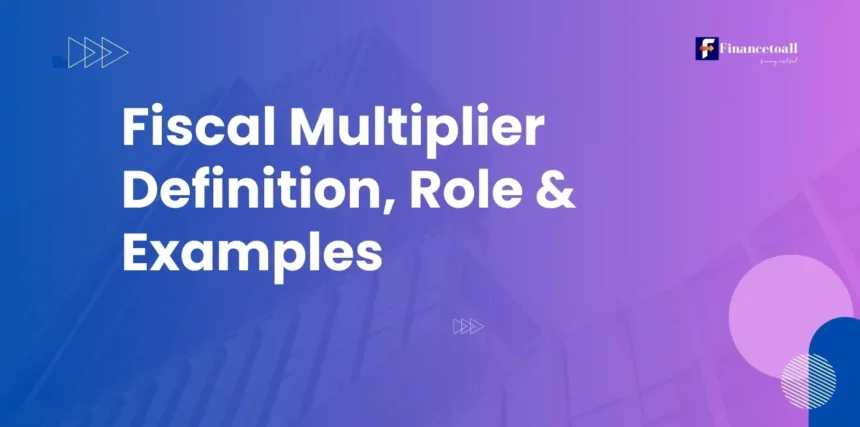Understanding the Fiscal Multiplier: A Key to Economic Growth and Stability
The fiscal multiplier measures how a change in government spending or taxation impacts the economy. It shows how much GDP (economic output) increases for every dollar spent or taxed by the government.
For example, a fiscal multiplier of 1.5 means that for every $1 the government spends, the economy grows by $1.50.
Fiscal multiplier measures how much the economy grows (or contracts) in response to changes in government spending or taxation. For example, if the government spends $1 billion on building roads, how much will that investment add to the country’s GDP? You will find the answer of it in Fiscal multiplier.
Key Takeaways
- Definition:
Measures the GDP impact of changes in government spending or taxation. - Key Factors:
Influenced by consumer spending (MPC), economic slack, and economy openness. - Spending vs. Tax Cuts:
Government spending usually has a higher multiplier than tax cuts. - Economic Recovery:
Targeted spending boosts growth and reduces unemployment in recessions. - Timing Matters:
Multipliers are larger in downturns and smaller during booms or high inflation.
Mechanics of the Fiscal Multiplier
Imagine dropping a stone into a still pond. The initial splash represents government spending, and the ripples symbolize the cascading effects of that spending on the broader economy. This analogy helps explain how the fiscal multiplier works.
Let’s break it down:
- Direct Spending: When the government funds a project, like building a bridge, the money goes to contractors and workers. This is the first “splash.”
- Indirect Effects: Workers and contractors then spend their earnings on goods and services, creating a ripple effect in other industries. For example, a construction worker might use their paycheck to buy groceries or pay rent.
- Induced Effects: The grocer or landlord then spends this income, continuing the cycle.
These cycles demonstrate the multiplier effect. Suppose the initial government spending of $1 billion leads to a $1.5 billion increase in GDP. The fiscal multiplier in this case is 1.5.
Real-World Example
Take the 2008 financial crisis. Governments worldwide implemented stimulus packages to kickstart their economies. In the U.S., initiatives like the American Recovery and Reinvestment Act were designed to maximize the fiscal multiplier by focusing on infrastructure, tax cuts, and aid to states.
The Formula in Action
Economists use a simple formula to express this concept:
For instance, if GDP grows by $2 billion following a $1 billion spending increase, the multiplier is 2. This formula highlights the central question: How much bang for the buck does government spending deliver?
Factors Influencing the Fiscal Multiplier
The effectiveness of fiscal policies is not universal. Multiple factors influence the size of the fiscal multiplier, including:
Economic Conditions
The fiscal multiplier tends to be higher during recessions. Why? Because resources like labor and capital are underutilized. In a booming economy, however, additional government spending might compete with private sector demand, reducing the multiplier.
Consumer Behavior
A critical factor is the marginal propensity to consume (MPC)—the likelihood of consumers to spend rather than save. If people save more, the ripple effect of government spending diminishes, reducing the multiplier.
Trade Openness
In open economies, a portion of the spending leaks out through imports. For example, if government spending increases demand for goods, but many of those goods are imported, the domestic economy might not see the full benefits.
Monetary Policy Interaction
If central banks raise interest rates in response to fiscal expansion, it could offset the benefits. This interaction demonstrates the delicate balance between fiscal and monetary policy.
What is the Role of the Central Bank in the Fiscal Multiplier?
The central bank can influence the fiscal multiplier by adjusting interest rates. When the central bank lowers rates, it encourages borrowing, investment, and spending, enhancing the impact of fiscal policies like government spending or tax cuts. Higher rates, on the other hand, can reduce the multiplier’s effect by making borrowing more expensive.
Applications in Policy Making
Understanding the fiscal multiplier helps policymakers decide where to allocate resources. For example, during the COVID-19 pandemic, governments worldwide used this concept to design stimulus packages.
Case Study: COVID-19 Stimulus
In 2020, the U.S. issued direct payments to households to boost spending. This decision was based on the idea that direct cash transfers have a higher multiplier because people are likely to spend the money immediately, supporting businesses and jobs.
Infrastructure Investments
Infrastructure projects often have high multipliers because they create jobs, improve productivity, and benefit the economy long-term. For instance, the construction of highways not only employs workers but also facilitates faster trade, boosting economic activity for years.
Implications for Financial Markets
The fiscal multiplier is not just an academic concept; it has real-world implications for investors and financial markets. When governments announce major spending plans, markets respond. For instance:
- Stock Markets: Infrastructure spending might boost the stock prices of construction companies.
- Bond Markets: Higher government spending can lead to increased borrowing, affecting bond yields.
- Currency Markets: If fiscal policies improve economic growth, a country’s currency might strengthen.
How Do Tax Cuts and Government Spending Differ in Impacting the Economy?
Both tax cuts and government spending stimulate the economy, but government spending generally has a larger impact. This is because spending directly creates jobs and demand, while tax cuts may lead to savings instead of immediate consumption, reducing their effect.
Conclusion
Understanding the fiscal multiplier isn’t just for economists; it’s a key to understanding how governments influence economies and how these changes might affect you. Whether it’s rebuilding after a crisis or planning for long-term growth, the fiscal multiplier plays a central role in shaping the world we live in.
FAQ on Fiscal Multiplier
1. What is the fiscal multiplier?
The fiscal multiplier is a concept used to measure the impact of a change in government spending or taxation on the overall economy. It tells us how much economic output (or GDP) increases when the government spends more or reduces taxes. For example, if the government spends $1 billion on infrastructure and the economy grows by $1.5 billion, the fiscal multiplier is 1.5.
2. How does government spending affect the fiscal multiplier?
Government spending directly increases demand in the economy. For example, when the government spends on infrastructure projects or public services, it creates jobs, increases consumption, and stimulates investment. If the economy is operating below full capacity (during a recession, for instance), this can result in a higher fiscal multiplier as idle resources (like unemployed workers) are put back to work.
3. What factors affect the size of the fiscal multiplier?
Marginal Propensity to Consume (MPC): The higher the MPC (i.e., the more people spend out of additional income), the larger the multiplier.
Economic Slack: The more unused capacity in the economy (like unemployed workers or factories running below capacity), the larger the multiplier effect.
Monetary Policy: If the central bank keeps interest rates low, it can amplify the multiplier, whereas higher rates can reduce it.
Openness of the Economy: In more open economies (with higher imports), a portion of government spending leaks out, reducing the multiplier effect.
4. How do tax cuts influence the fiscal multiplier?
Tax cuts can increase disposable income for individuals and businesses, leading to increased spending and investment. However, the impact might not be as large as government spending because some of the tax savings may be saved rather than spent. In periods of recession, tax cuts are more likely to have a larger effect as people and businesses tend to spend the additional money.
5. Does the fiscal multiplier work the same in all economies?
No, the fiscal multiplier can vary greatly depending on the country’s economic condition and structure. In developed economies, with less unused resources, the multiplier might be smaller, while in developing economies, with more room for growth, the multiplier could be larger. Additionally, if a country has a high level of public debt, the multiplier could be smaller because investors may worry about the sustainability of government spending.
6. How does the fiscal multiplier change during a recession?
During a recession, the fiscal multiplier is typically larger because there is significant unused capacity in the economy. Increased government spending can quickly put unemployed workers back to work and stimulate demand for goods and services, which in turn drives economic growth. Tax cuts can also boost consumer spending, as people are more likely to use the extra income to meet immediate needs.
7. Is the fiscal multiplier always positive?
While the fiscal multiplier is typically positive in economic downturns, it can sometimes be negative or smaller in times of economic boom. For example, if the economy is already operating at full capacity, additional government spending may lead to inflation rather than increased output. In such cases, the government’s spending may “crowd out” private investment or lead to higher prices, not more production.









